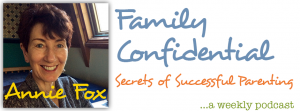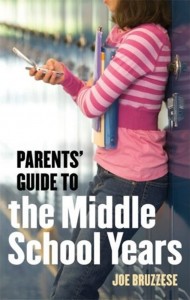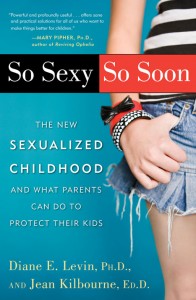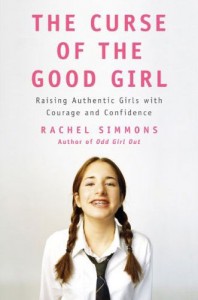|
|
February 15, 2014
 Laugh. Listen. Learn. Strengthen your family. I love listening to great podcasts and I love producing them. That’s why I felt sad (and a tad guilty) when “other stuff” forced David and me to go on hiatus in 2011 from my Family Confidential podcast. The break allowed us to develop several award-winning books and apps, but it was always my intention to get back in the studio with a weekly podcast. We’re back now, with video, and it feels great.
So grab a cup of coffee and c’mon over to Family Confidential where you can choose from an impressive range of engaging conversations with top parenting experts. (All free… of course!) Whether you’re looking for information about picky eaters, single parenting, advocating for your child with special needs, handling moody teens or improving your relationship with your step kids (who may also be moody teens), you’ll find it at Family Confidential. You’ll also find lots to think about, lots to laugh about, and many proven strategies for parenting kids in the 21st century and teaching them to be good people.
Got your coffee? I’ve got mine. Now let’s check out our most recent podcasts together:
Kelly Hirt: Lifeline tips for special needs parents
Dr. Lynne Kenney: Helping your kids blossom
Sarah Newton: The push kids need to succeed
Rosalind Wiseman: Violent video games, what parents can do
Carrie Goldman: Tweens and Social Media
Tune in every Friday for a new Family Confidential podcast. Until then, happy parenting!

March 8, 2010
 "Parents' Guide to the Middle School Years" by Joe Bruzzese In honor of the upcoming 1st anniversary of the launch of our podcast series Family Confidential we remastered the first two podcasts to improve the sound quality. We’ve learned a lot in the past year about how to produce great podcasts. We must be doing something right because we’ve had close to 18,000 downloads of these puppies.
So… for your listening enjoyment, here’s Podcast #01: The Gift of Confidence (redux)
**********
We all want our kids to succeed and grow up up to be confident, resilient, thoughtful young adults who can competently manage their own lives. But sometimes what we say we want is at odds with our parenting choices. Boy is it ever! Especially when it comes to doing what’s really necessary to help our children develop independence. Like when we say: “Your homework is your responsibility” and then spend the entire afternoon and evening nagging: “Do you have a lot of homework?” “How much do you have?” “I thought you were working on your homework!” “Did you finish your homework?” “Let me check your homework.” Auugggh! Not only will all this micro-managing create loads of tension, it’s also doing nothing to encourage self-confidence in your child.
In this episode of Family Confidential, The Gift of Confidence, I talk with Joe Bruzzese M.A., author of “A Parents’ Guide to the Middle School Years”. Joe’s book and his ongoing work as a parent coach offer practical advice for building confidence in your child.
Listen here (QuickTime required):
[QUICKTIME http://www.anniefox.com/podcast/FC001.m4a 300 300 false true]
If you have iTunes, you can subscribe to this podcast in the iTunes Store.
Or, you can download an MP3 version here.
Subscribe to Family Confidential and tune in each time!
*What’s a podcast? “A podcast is a series of digital media files, usually either digital audio or video, that is made available for download via web syndication.” — Wikipedia… So, in this case, there’s an audio file for you to listen to (in addition to reading the above).

January 17, 2010
 “So Sexy So Soon: The New Sexualized Childhood and How Parents Can Protect Their Kids” by Diane E Levin, Ph.D. Little girls have dreamed of being princesses as long as there have been fairy tales. Thanks to Hans Christian Anderson, I myself had a slightly off-kilter fantasy of growing up to be a mermaid. But if I wanted to dress up as a mermaid for Halloween or to paddle around in my friend’s plastic pool I needed to create my own tail, so to speak. Like all former kids who are now today’s parents, my fantasies came directly from my own imagination… evolving naturally from my interests and taking me into realms I chose to explore through play.
But for 21st century kids, kids who live and breathe packaged princesses, Bratz dolls and Transformers, things are very different when it comes to what they play with, how they play and what they wear.
If you’ve got a daughter who can walk and talk you’ve likely had at least a few conversations and some strong disagreements about her choice of clothes. There’s nothing new about any of this. It’s the job of every generation to attempt to scandalize their parents. We did it to our parents and we didn’t turn out so bad.
But pop culture is way more extreme now and something very destructive is being foisted on our kids via TV shows, movies, print and media ads and on the racks in children’s clothing stores. For one thing, styles for girls of all ages are moving in a very dangerous direction. So much of what’s sold is too short, too tight, too low cut, too peek a boo, too… sexy for little girls. Yet there it all is. And they want these styles. Man, do they want them! Because their friends wear them and because too many little girls, tweens and teens truly believe that their value as people is a direct function of how they look.
It gets harder and harder for parents to carry out our prime objectives: keeping our kids safe and raising them to be compassionate, thoughtful, self-assured young adults. But the issue goes way beyond short shorts, crop tops and G-strings marketed for tweens. Beyond TV shows and toys that program girls and boys to think and act and play and dream in the narrowest, most gender-specific ways.
What’s going on here in 21st Century America is a war of values. On one side, parents doing their best to raise healthy young adults. And what are we up against? The marketing might of multi-billion dollar corporations. You probably don’t need anyone to tell you who’s winning.
In this week’s podcast I talk with Diane E. Levin, co-author of So Sexy So Soon: The New Sexualized Childhood And What Parents Can Do to Protect Their Kids.
Dr. Levin is Professor of Education at Wheelock College in Boston. She has written seven other books including: The War Play Dilemma, Teaching Young Children in Violent Times and Remote Control Childhood? Diane Levin speaks around the world on the impact of violence, media and other societal issues on children, families and schools.
Listen to my interview with Diane Levin right here:
[QUICKTIME http://www.anniefox.com/podcast/FC014.m4a 300 300 false true]
If you have iTunes, you can subscribe to this podcast in the iTunes Store.
Or, you can download an MP3 version here.
Upcoming guests include:
Amalia Starr, author of Raising Brandon: Creating a Path to Independence for your Adult “kid” with Autism & Special Needs
Matthew Amster-Burton, author of Hungry Monkey: A Food-Loving Father’s Quest to Raise an Adventurous Eater
David McQueen, international speaker empowering adults and youth alike on subjects such as leadership, careers and communication skills.
Hannah Friedman, author of Everything Sucks: Losing My Mind and Finding Myself in a High School Quest for Cool
Dara Chadwick, author of You’d Be So Pretty If…
*What’s a podcast? “A podcast is a series of digital media files, usually either digital audio or video, that is made available for download via web syndication.” –Wikipedia… So, in this case, there’s an audio file for you to listen to (in addition to reading the above).

November 9, 2009
 The Curse of the Good Girl by Rachel Simmons If you live or work with teen girls you don’t need me to tell you they can be way out there with their emotions. And you already know that girl friendships can be fraught with drama, misunderstandings, betrayals and recriminations. Which proves that being emotional doesn’t automatically translate into high Emotional Intelligence. (EQ, AKA getting real with yourself so you can be real with the people you’re close to. )
When teen girl emotion explodes around parents, they often do what moms and dads of my parents’ generation did… try to contain and sanitize the feelings. Why? Perhaps some parents sincerely believe that people who are too emotional get clobbered by life. Another possibility is that when confronted with a girl’s outburst that parents can’t “fix” the next best solution is to try to shut it down as quickly as possible. Either way the message is that some emotions are just not the “good girl” kind.
If a girl expresses sadness she may hear: “Cheer up. It can’t be all that bad!”
If she expresses fear she might get: “There’s nothing to be afraid of!”
If she rages over some real or imagined injustice she may be treated to some variation of this 20th century chestnut: “Better watch it, young lady. You’re getting a little too big for your britches.”
When I was a child, the most powerful phrase I knew was “Shut up!” Only used in a rare moment of frustration and laughably tame by today’s standards, those words were consistent show stoppers in my family and always followed by: “That language is unacceptable.” I realize now that it was my assertiveness that was truly unacceptable.
21st century parental messages to girls haven’t changed all the much: Don’t be sad. Don’t be scared. Don’t be angry. Oh, and while you’re at it: Don’t be shy. Don’t be worried. Don’t be embarrassed. Don’t be so silly. Don’t be so dramatic. Don’t be so smart.
If girls can’t be any of those things, what, in heaven’s name, are they supposed to be? Duh! They’re supposed to be GOOD! At all times sweet, loving and cooperative. Modest, supportive, nurturing, generous and nice. But what are girls expected to do when any of those other not so good and not so nice feelings pop up? No problem. If you want to be a good girl (Yes, please!) you learn to stuff it and smile.
In this week’s podcast I talk with Rachel Simmons, author of The Curse of the Good Girl: Raising Authentic Girls with Courage and Confidence. And what a terrific and important book it is. Here’s an excerpt:
________
To deepen your vision for your daughter, write her a letter (you don’t have to send it) and explore these questions:
- What do you wish you had known when you were her age? Think about the girl you used to be and the woman you are today. Focus on what you have learned about relationships, conflict, and self-confidence.
- What does being yourself mean to you?
- What did the female role models of your childhood teach you? If you did not have any, what do you wish you might have learned from a caring adult woman?
You have learned many lessons in your life. By defining them for yourself, you can begin thinking about how to convey practical wisdom to your daughter, in both what you say and how you act.
____________
Listen to my interview with Rachel Simmons right here:
[QUICKTIME http://www.anniefox.com/podcast/FC011.m4a 300 300 false true]
If you have iTunes, you can subscribe to this podcast in the iTunes Store.
Or, you can download an MP3 version here.
Upcoming guests include:
Rosalind Wiseman, author of Queen Bees & Wanna Bees and Queen Bee Moms & Kingpin Dads
Izzy Rose, author of The Package Deal: My (not-so) Glamorous Transition from Single Gal to Instant Mom
Diane E. Levin, co-author (with Jean Kilbourne) of So Sexy So Soon: The New Sexualized Childhood And What Parents Can Do to Protect Their Kids
Susan M. Heim, author of It’s Twins! and Chicken Soup for the Soul Twins and More
Hannah Friedman, author of Everything Sucks: Losing My Mind and Finding Myself in a High School Quest for Cool
Dara Chadwick, author of You’d Be So Pretty If…
*What’s a podcast? “A podcast is a series of digital media files, usually either digital audio or video, that is made available for download via web syndication.” –Wikipedia… So, in this case, there’s an audio file for you to listen to (in addition to reading the above).
 — Older Posts »
| |















